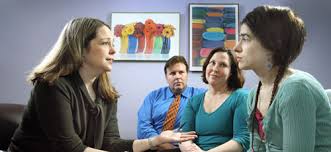 Anorexia is a complex eating disorder with roots in distorted self-image, psychiatric disturbance and emotional unrest. Because the problem is complex, the solution must also address all the issues that the person with anorexia struggles to ensure a higher rate of recovery.
Anorexia is a complex eating disorder with roots in distorted self-image, psychiatric disturbance and emotional unrest. Because the problem is complex, the solution must also address all the issues that the person with anorexia struggles to ensure a higher rate of recovery.
One of those treatments is family therapy. In persons who suffer from anorexia, family therapy will increase the likelihood of a full recovery in the patient. The goal behind this phase of the treatment is to help the family help the sufferer in a way that is non-threatening and accepting while being able to work out their own issues and feelings around the disease in a safe and confidential environment.
Some other reasons for family therapy in anorexia are to keep the lines of communication open between the family and friends and the person suffering from anorexia. This open communication gives the person experiencing the disease the added support needed to make a successful recovery.
During family therapy all members can have a chance to vent their feelings and help people get to the root of the issues. Often the therapist will act more as a mediator than a therapist or move back and forth between both roles. They may give the family members ‘home work’ to do outside of the therapeutic time so that when they return they are ready to address the issues and feelings they unrooted at home.
 People with anorexia have a better rate of recovery when they are surrounded by supportive and protective family and friends whose interest lie in the recovery of the person suffering and not in lashing back at someone they perceive to have harmed them in some fashion. Family therapy helps those family members who believe they’ve been hurt to work through those hurts without causing the person with anorexia to feel the brunt of that anger.
People with anorexia have a better rate of recovery when they are surrounded by supportive and protective family and friends whose interest lie in the recovery of the person suffering and not in lashing back at someone they perceive to have harmed them in some fashion. Family therapy helps those family members who believe they’ve been hurt to work through those hurts without causing the person with anorexia to feel the brunt of that anger.
During family therapy another family member who may be suffering from this condition may also be discovered. With new research scientists are discovering a genetic predisposition to using eating to control the environment. This essentially means that although genetics doesn’t make a person have anorexia the potential is greater in some families than it is in others to develop this method of coping with stress.
During family therapy the therapist may discover issues that have contributed to the process of the development of anorexia. The counselor can then intervene at a level of the entire family instead of just at the level of the person suffering from anorexia to improve the likelihood of a successful recovery, healing process and development of more stable family relationships.
The condition of anorexia nervosa leads the sufferer to require close monitoring and reconstruction of poor eating habits and a more healthy body image as well as control of their obsessive and self-destructive behavior patterns. Family therapy allows the family to work through this process in a constructive manner as a whole.
Family therapy can be used to help parents, spouses, siblings, friends, grandparents and other relatives who have intimate contact with the patient to learn ways in which they can best help the person suffering from anorexia to recover. This is not only helpful but essential for a complete recovery for the person who experiences the devastating effects of this psychiatric disorder.
Resources:
PsychCentral: Treatment for Anorexia
http://psychcentral.com/lib/treatment-for-anorexia/000101
Stanford School of Medicine: Family Therapy for Anorexia more Effective than Individual Therapy
http://med.stanford.edu/ism/2010/october/anorexia.html
HelpGuide: Anorexia Nervosa
http://www.helpguide.org/mental/anorexia_signs_symptoms_causes_treatment.htm
MayoClinic: Anorexia Nervosa
http://www.mayoclinic.com/health/anorexia/DS00606/DSECTION=treatments-and-drugs
Nova Southeastern University: Investigation of the Role of the Family in Anorexia Nervosa Treatment
World Psychiatry: The Maudsley Family Based Treatment for Adolescent Anorexia Nervosa
http://www.ncbi.nlm.nih.gov/pmc/articles/PMC1414759/
Journal of the Royal Society of Medicine: Family Therapy for Anorexia Nervosa in Adolescence
http://www.ncbi.nlm.nih.gov/pmc/articles/PMC1293285/


Leave a Reply